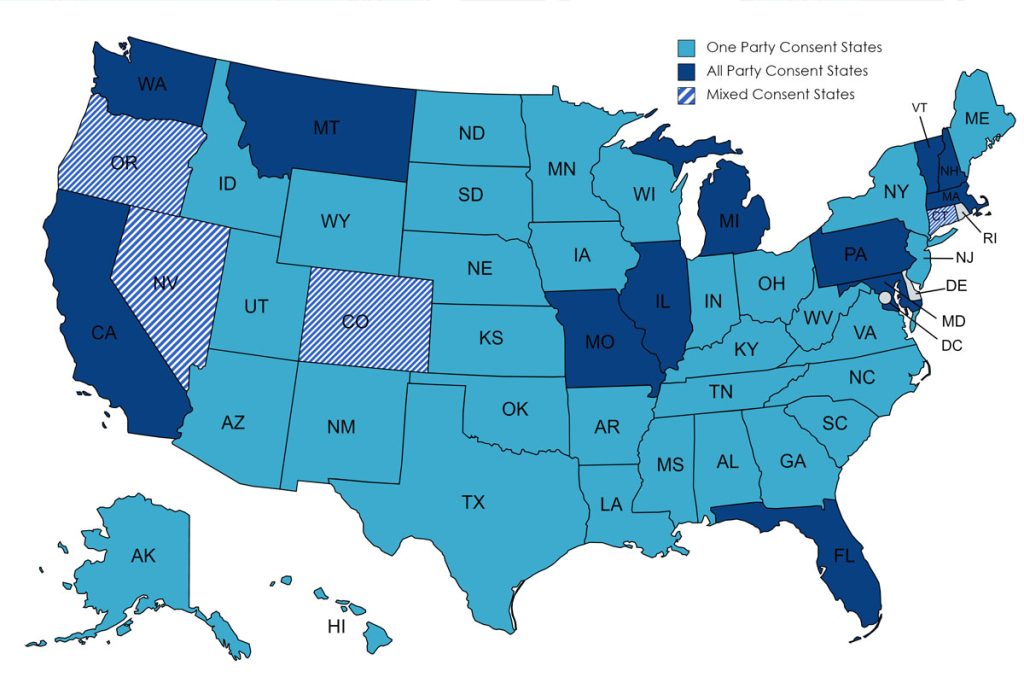
This is a handy guideline to know whether the recording laws in each state are one party or two party consent. There is also a table at the end of this page with a simplified overview, or view each state’s page for a more in-depth analysis.

Hawaii, Illinois, Michigan, Missouri, Montana, Oregon, and Vermont all have special provisions so if you are interested in the laws related to those states it’s worthwhile to visit the state page to read the in-depth overview.
*RecordingLaw.com prefers to err on the side of caution with these states as they have special provisions. Make sure to read the state rules for your specific state.
Check your states individual recording laws by scrolling down for a short synopsis on the table, or click through to your state for a more in-depth overview.
Click here to see more information on One Party Consent States
One party consent means that an individual is able to record conversations that they are a part of without the other person (or persons) consent. You should still make sure to look at the individual laws for each state as there are a few small differences between them. A general rule for one party consent states is that if you are part of the conversation you are allowed to record it.
California, Connecticut, Florida, Maryland, Massachusetts, Michigan*, Missouri*, Montana* (Requires notification only), Nevada, New Hampshire, Oregon*. Pennsylvania, Vermont*, Washington, Illinois.
*RecordingLaw.com prefers to err on the side of caution with these states as they have special provisions. Make sure to read the state rules.
In Two party (or all party) consent states it is required by state law that all parties that partake in a conversation must have given consent for that conversation to be recorded when there is an expectation of privacy. This law covers private as well as public places, if there is an expectation of privacy, consent must be given. Generally, video may be recorded in public places with the caveats that your video does not capture the audio or subject of the conversation, and the people are speaking in a public place. Check your states individual recording laws by scrolling down for a short synopsis on the table, or click through to your state for a more in-depth overview.
Click here to see more information on Two Party Consent States
| State | Simple Terms | Law |
|---|---|---|
| Federal | Federal law dictates that when no other law applies that it is a one party consent region. State laws will supercede this, so make sure to check your local state laws. | Electronic Communications Privacy Act of 1986 (ECPA) & 18 U.S. Code § 2511 |
| Alabama | According to Ala. Code § 13A-11-30 you are not allowed to video record people in “A place where one may reasonably expect to be safe from casual or hostile intrusion or surveillance, but such term does not include a place to which the public or a substantial group of the public has access”. | Ala. Code § 13A-11-30 |
| Alaska | Alaska's highest court has specifically held that the eavesdropping statute is only in place to address 3rd party interceptions. They do have specific protections in place for nude photo and film. | Alaska Stat. Ann. § 42.20.330, § 42.20.310,§ 11.61.123 |
| Arizona | Consent is required to record conversations in which there is a legal expectation of privacy, though consent is not required in places where there is no reasonable expectation of privacy such as a street or park. One major caveat is that the owner of the telephone line may record phone calls without taking part of them (such as a business owner). | Ariz. Rev. Stat. Ann. § 13-3001, § 13-3012 |
| Arkansas | Ark. Code Ann. § 5-60-120 Consent is required to record conversations in which there is a legal expectation of privacy, though consent is not required in places where there is no reasonable expectation of privacy such as a street or park. | Ark. Code Ann. § 5-60-120 |
| California | It is a criminal offense to use any device to record communications, whether they’re wire, oral or electronic, without the consent of everyone taking part in the communication. This means that in California you are not legally allowed to record a conversation you are taking part in unless all parties are in agreement. However, one exception allows that if a conversation taking place in public, within government proceedings, or under conditions where one could be easily overheard is recorded, this cannot be punished under California’s eavesdropping statute. Cal. Penal Code § 632. California also has unique laws as it pertains to the entertainment industry and paparazzi. | |
| Colorado | In Colorado it is a criminal offense to use any device to record communications whether it’s wire, oral or electronic without the consent of at least one person taking part in the communication. Albeit there is a caveat in that recording is allowed to take place if there is no reasonable expectation of privacy such as a public place such as a street or park. | Colo. Rev. Stat. § 18-9-304 |
| Connecticut | Connecticut can be considered as both a one party state and two party state. This is because there are different laws for in-person conversations and telephone conversations. Read on for more information. | Conn. Gen. Stat. § 53a-187(a)(2), Conn. Gen. Stat. § 52-570d(a) C.G.S.A. § 52-570d |
| Delaware | It is a criminal offense to use any device to record communications, whether they are wire, oral or electronic, without the consent of all parties taking part in the communication. This means that in Delaware you are not legally allowed to record a conversation you are taking part in unless all parties are in agreement. Del. Code Ann. tit. 11, § 1335(a)(4). |